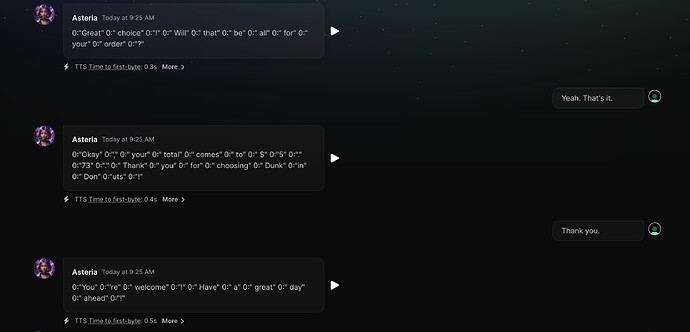Hello,
Is function call incompatible with streaming? I have an example without streaming and it works well. When I set stream:true , then I am not getting the functions calling works. I am trying to build a drive thru app and do recursive calls based on order single item or multiple items. Can someone help me how to do recursive calling with streaming?
import OpenAI from "openai";
import { OpenAIStream, StreamingTextResponse } from "ai";
import { functions } from './functions';
import type { ChatCompletionCreateParams } from 'openai/resources/chat';
// Optional, but recommended: run on the edge runtime.
// See https://vercel.com/docs/concepts/functions/edge-functions
export const runtime = "edge";
const openai = new OpenAI({
apiKey: process.env.OPENAI_API_KEY!,
});
// Example tool definitions
const tools = {
'order-single-item': (args) => {
// Logic to handle a single item order
console.log('Ordering Single Item:', args);
// Implement the ordering logic here
},
'order-menu-item': (args) => {
// Logic to handle a menu item order
console.log('Ordering Menu Item:', args);
// Implement the ordering logic here
},
'order-drink-item': (args) => {
// Logic to handle a drink item order
console.log('Ordering Drink Item:', args);
// Implement the ordering logic here
},
};
export async function POST(req: Request) {
// Extract the `messages` from the body of the request
const { messages } = await req.json();
const start = Date.now();
// Request the OpenAI API for the response based on the prompt
try {
const response = await openai.chat.completions.create({
model: "gpt-4",
stream: true,
messages: messages,
//tools: tools,
//tool_choice:"auto",
});
//console.log("messages ====>", messages);
//console.log("response ===>", response);
const stream = OpenAIStream(response);
let toolInvocation = {
name: null,
arguments: "",
};
// Example pseudo-logic for tool invocation based on accumulated data
if (toolInvocation.name && typeof tools[toolInvocation.name] === "function") {
try {
// Assuming toolInvocation.arguments is a stringified JSON, parse it
// If it's not in JSON format, adjust this part accordingly
const args = JSON.parse(toolInvocation.arguments);
tools[toolInvocation.name](args); // Invoke the tool with parsed arguments
} catch (error) {
console.error("Error invoking tool or parsing arguments:", error);
// Handle errors appropriately
}
}
const responsestream = new StreamingTextResponse(stream, {
headers: {
"X-LLM-Start": `${start}`,
"X-LLM-Response": `${Date.now()}`,
},
});
//console.log("resstream ===>",responsestream);
return responsestream;
} catch (error) {
console.error("Error: ", error);
return new Response(JSON.stringify({ error: error.message }), {
status: 500,
headers: { 'Content-Type': 'application/json' },
});
}
}


